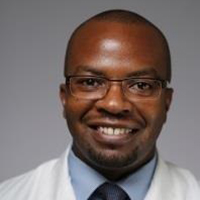
Interview with Dr. Stephen Kimani
Dr. Kimani is a board-certified internal medicine physician and a current third-year clinical fellow in Hematology/Oncology at the University of North Carolina at Chapel Hill. He has spent a great part of the past decade training and practicing medicine in various settings worldwide, including Kenya, Tanzania, South Africa, Malawi, and the USA. Before joining UNC, he completed a Master of Science in global health and internal medicine residency at Duke University. At the beginning of the COVID-19 pandemic, Dr. Kimani was involved in FellowsACHIEVE, a multi-institutional education collaboration across the US through which emerging knowledge regarding priority issues on COVID-19 and oncology care was reviewed and rapidly disseminated. Performed in partnership with the UNC Lineberger Cancer Network, an archive of FellowsACHIEVE videos may be found at www.fellowsachieve.org. Through this innovative platform, he was able to leverage collective learning from national experts on key issues regarding this novel infection.
We are delighted that Dr. Kimani will be UNCLCN’s guest speaker on March 24, 2021 and will be discussing “Covid-19 and Oncology.” I recently had the pleasure of interviewing him.
Dr. Kimani, what attracted you to this medical specialty?
I have always been amazed by the capacity of human resilience and hope. As a physician, I enjoy establishing longitudinal relationships with my patients and their circle of care that allow me to care for the “whole” even through adversity. I found this to be true in oncology.
When others find out what you do, what do they usually say or ask?
Most times, there is usually a bit of an awkward pause (your guess on why is as good as mine). Sometimes, this pause is followed by “it must be difficult to be a cancer doctor. How do you do it?” Other times, the subsequent questions tend to demonstrate the person’s own biases.
What do you find most challenging about your job?
Cancer is a complex disease in all regards – physically, mentally, and even socioeconomically. The most challenging aspect is balancing the care we deliver to respond to these challenges in a patient-centered manner.
Tell me about one of the most memorable people you’ve met while working at UNC and why they are so notable.
Most people I have met at UNC have been memorable in some way. Without giving specifics, there are many people, including patients, faculty, and colleagues, that have remained memorable over the years.
How would your family and/or colleagues describe you?
I would like to think that they would say patient, consistent, and persistent.
What projects are you currently working on?
I am working on two studies about cancer outcomes in Malawi. One is looking at cancer survivors’ quality of life, and the other is exploring a cancer medicine, rituximab, on malaria immunity.
If you had $50,000 to donate to UNC, what would you do with it and why?
I will set up a fund to help offset parking fees for cancer patients and their caregivers when they come for their appointments.
How has oncology treatment changed since Covid-19?
It has been a mixed bag over the past year or so, with different changes occurring at different times during the pandemic. For example, in the beginning, when a lot was unknown about the virus and its effect among cancer patients, the safety of starting certain types of cancer treatments was unclear. Moreover, disruptions in care systems, including screening tests, referrals, evaluations, and treatment, have been a challenge. Over time, we have learned and adapted our systems of care to mitigate these challenges.
What extra steps do you take to remain healthy through Covid-19?
To remain physically healthy, I personally maintain a social bubble and adhere to the 3 W’s – wearing a mask, washing hands, and waiting 6 ft apart. Mentally, I have connected deeply with my podcasts (not related to medicine), gone for hikes or walks, listen to uplifting music or watch shows, and frequently talk with family and friends.
If you weren’t working in oncology, what would your life be like?
I think I would be working in global health programming with an organization like the WHO. I cannot imagine missing out on patient care, so I do not think my life would be great.
What do you do when you aren’t working?
I listen to podcasts, go for hikes around the triangle, read financial wellness blogs, or cook.
Dr. Kimani, thank you for your time, and for such an enlightening interview!
Please visit the UNC Lineberger Cancer Network site at unclcn.org and register for any upcoming lecture of interest. You may take specified past lectures for credit in our UNCLCN Learning Portal at https://learn.unccn.org or browse our entire collection of oncology-focused videos at http://www.unclcn.org/lecturelibrary.